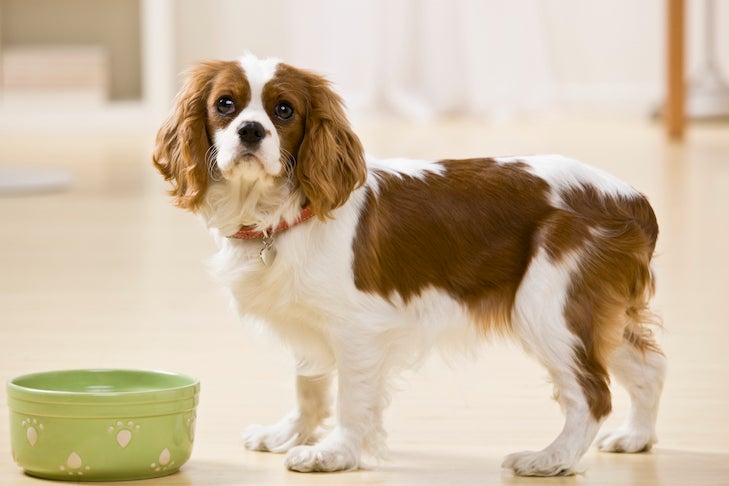
AKC is a participant in affiliate advertising programs designed to provide a means for sites to earn advertising fees by advertising and linking to akc.org. If you purchase a product through this article, we may receive a portion of the sale.
As a general rule, adult dogs need about one ounce of water per pound of body weight per day. But, despite their smaller size, growing puppies drink more than their adult counterparts.
Very young puppies fulfill their hydration needs from their mother’s milk. As they’re being weaned and starting to eat solid food, they’ll need a fresh supply of water. Generally, young puppies need about one-half cup of water every two hours. You’ll want to monitor your puppy to make sure they’re drinking enough, but not too much.
Older puppies that have already been weaned generally need between one half ounce and one ounce of water per pound of body weight per day. For example, if your puppy weighs 20 pounds, they’ll need between 10 and 20 ounces of water each day. On especially active days, they may need more than that.
Water Intake During Housetraining
The water rules change a bit during house-training. It’s best to remove your puppy’s water bowl at night. Be consistent with the time you remove water, the same way you’re consistent with feeding times. As a rule of thumb, remove the food and water bowls about two to three hours before bedtime. So, if your lights-out time is at 11 p.m., a puppy should have no food or water after about 8 p.m. This gives you a chance to take them out for one last potty break before settling in for the night.
However, it’s important not to take this advice too far by restricting your puppy’s water during the day. Puppies are more prone to dehydration than adult dogs because of their greater need for water. Restricting water intake can also lead to behaviors like resource guarding. So, even while housetraining, you should give your puppy their regular amount of water during the day.

Why Is Water So Important for Puppies?
Water facilitates the metabolic processes – everything from digestion to brain activity, blood flow, and breathing. Blood is mostly composed of water, and as it flows through your dog’s body, it clears harmful toxins and transports oxygen. Without water, this exchange can’t happen, which can harm vital organs.
Water also regulates your puppy’s body temperature. In hot weather, you may see your puppy panting. Panting helps keep a dog cool by releasing water through evaporation. But, on the other hand, they’re losing water through the tongue, so may need to drink more water than usual.
Canine Dehydration
Most dogs, even puppies, naturally self-regulate when it comes to drinking water. But there are cases when your puppy may not drink enough and risk dehydration. Some potential causes of dehydration include vomiting, fever, excessive urination, or diarrhea.
Some dogs just don’t seem very tempted by their bowl of fresh water. If your puppy eats mostly dry food, they also may not be getting enough water. Aside from noticing any of the causes listed, you can get a good idea of whether your puppy is drinking enough water by monitoring their water intake, using the water-to-body-weight calculation.

There are also a few tests you can do quickly to check for dehydration:
- Grab the scruff of your puppy’s neck gently, stretch it out, and then let go. The skin should snap right back into place. If it’s slow to snap back, your dog is dehydrated.
- Feel their gums. If they’re dry or sticky, they need more water.
- Press your finger gently against their gums, which temporarily blocks the flow of blood. While you’re pressing their gums, the area will turn white. When you release the pressure, the area should return to a healthy pink within two seconds. If it takes longer, your puppy is dehydrated. The gums of a normal dog refill immediately, and the gums of a dehydrated dog could take up to three seconds (or more) to refill.
If you notice that your puppy doesn’t seem to be drinking enough water, you can make some changes around the house to encourage them to drink:
- Make sure their water bowl is clean, and regularly fill it with fresh water
- Place their water bowl near their food, bed, or any place they like to hang out in the house
- Reward them with a treat or praise when they take a drink
- Flavor their water with bone broth or chicken broth to make it more enticing
- Offer them ice cubes. Some dogs love chewing on ice cubes, and this is another way to increase water intake.

Overhydration in Dogs
Believe it or not, dogs can overhydrate, as well. Also called “water intoxication,” overhydration can be as dangerous as dehydration. It can be caused by drinking too much water, including water the dog inadvertently takes in while swimming or playing in the water.
If you suspect that your dog is overhydrated or exhibiting any of these symptoms, contact your veterinarian:
- Lethargy
- Nausea
- Loss of coordination
- Staggering
- Bloating
- Dilated pupils
- Excessive salivation
- Vomiting
- Pale gums
Puppies that drink more water than usual may have polydipsia, which could be a sign of underlying metabolic changes, such as kidney issues, infection of the uterus, diabetes, or Cushing’s disease. This is especially true if it’s paired with an increase in urination. Always check with your veterinarian if you have concerns about the puppy’s water intake.
Having a new puppy comes with so many responsibilities. You have to decide what food to use, which toys are safe, how to housetrain, and so much more. But monitoring water intake is just as important and should become a part of routine daily care. Proper hydration contributes to your puppy’s overall health and well-being.

